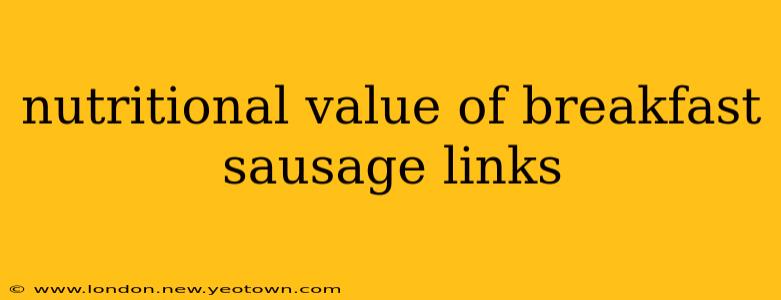Breakfast sausage links—the savory, sizzling start to many mornings. But beyond the delicious taste, what's the nutritional story behind these breakfast staples? Let's delve into the details, exploring the nutritional value and addressing common questions surrounding this popular breakfast item.
My name is Alex, and I've spent years researching the nutritional content of various foods. I'm passionate about helping people make informed dietary choices. This article aims to provide you with a comprehensive overview of breakfast sausage links' nutritional profile, empowering you to make the best decisions for your health and wellbeing.
What is the Nutritional Content of Breakfast Sausage Links?
The nutritional content of breakfast sausage links varies significantly depending on the brand, type (pork, chicken, turkey, etc.), and specific ingredients. However, a typical serving (approximately 2-3 links, around 100 grams) generally contains:
- Calories: Around 200-300 calories.
- Protein: 15-20 grams. A good source of protein for helping you feel full and satisfied.
- Fat: 15-25 grams. This includes both saturated and unsaturated fats. The type and amount of fat vary considerably depending on the sausage.
- Sodium: Often high, ranging from 400-800 milligrams or more. This is a significant concern for individuals watching their sodium intake.
- Carbohydrates: Relatively low, usually under 5 grams.
- Cholesterol: Can be high, often exceeding 100mg per serving.
It's crucial to always check the nutrition label on the specific brand and type of sausage you're consuming for the most accurate information.
Are Breakfast Sausage Links Healthy?
This is a complex question with no simple yes or no answer. Breakfast sausage links can be part of a healthy diet in moderation. However, their high fat, sodium, and cholesterol content means they shouldn't be a daily staple.
The healthfulness depends heavily on the ingredients. Sausages made with leaner meats and lower sodium content are better choices than those packed with saturated fat and excessive sodium. Look for options with reduced fat and sodium on the label.
What are the Benefits of Eating Breakfast Sausage Links?
While not a health food per se, breakfast sausage links do offer some benefits:
- Protein Source: They provide a decent amount of protein, contributing to satiety and muscle maintenance.
- Convenience: They are a quick and easy breakfast option, perfect for busy mornings.
- Flavor and Satisfaction: Their savory taste can be a satisfying way to start the day.
What are the Downsides of Eating Breakfast Sausage Links?
The downsides are significant and should be carefully considered:
- High in Saturated Fat: High saturated fat intake is linked to increased cholesterol levels and heart disease risk.
- High in Sodium: Excessive sodium can contribute to high blood pressure.
- High in Cholesterol: High cholesterol intake can also negatively impact heart health.
- Processed Meat: Many breakfast sausages are processed meats, which have been linked to an increased risk of certain cancers.
Are there healthier alternatives to breakfast sausage links?
Absolutely! There are many healthier alternatives to traditional breakfast sausage links, including:
- Leaner Meats: Choose sausages made from leaner meats like turkey or chicken.
- Plant-Based Options: Consider plant-based sausages made from soy, mushrooms, or other vegetables. Many of these options are lower in fat and cholesterol.
- Homemade Sausage: Making your own sausage gives you complete control over the ingredients, allowing you to choose leaner meats and reduce sodium and other additives.
How many breakfast sausage links should I eat per day?
There's no single answer, as it depends on individual dietary needs and overall health goals. If you choose to include breakfast sausage links in your diet, limit your intake to a small serving (1-2 links) a couple of times a week, at most.
Can I eat breakfast sausage links while on a diet?
It is possible to include breakfast sausage links as part of a weight loss plan, but only in very small portions and as part of a balanced diet. Prioritizing whole, unprocessed foods and limiting processed meats like sausages is recommended for successful and healthy weight loss.
In conclusion, breakfast sausage links can be a delicious treat occasionally, but they shouldn't be a regular part of a healthy diet due to their high fat, sodium, and cholesterol content. Be mindful of portion sizes, check nutrition labels carefully, and consider healthier alternatives whenever possible. Remember to consult with a healthcare professional or registered dietitian for personalized dietary advice.

